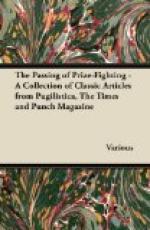THE MERRY WIDOW (GRASS).
“Mother’s help,
to assist lady; husband away; happy
home.”—Birmingham
Daily Post.
* * * * *
“A St. Cleather man,
who had planted a wastrel, is to be invited
to attend the next meeting.”—Western
Morning News.
Surely they don’t want the wastrel dug up again.
* * * * *
[Illustration: FRATERNISING AT THE FRONT.
Nervous Tommy (on outpost duty for the first time). “’OO GOES THERE?”
Bosch Scout. “FRIEND.”
Tommy. “ADVANCE AN’ BE RECONCILED.”]
* * * * *
A NEW USE FOR LATIN.
BY OUR CLASSICAL EXPERT.
“Greek is in the last ditch,” writes Sir HENRY NEWBOLT in his New Study of English Poetry; “Latin is trembling at sight of the thin edge of the wedge.” Still a hope of saving Latin—within limits—yet remains, if the appeal of “Kismet” in The Spectator meets with a sympathetic response. He asks the readers of that journal “to render into Latin in two or three words the old cricket adjuration, ’Play the game.’” He has already had some suggestions, including “Lude ludum,” from “an eminent scholar,” but, like the late Mr. TOOLE in one of his most famous songs, still he is not happy.
In rendering colloquial phrases into the lapidary style of ancient Rome, I confess it is often hard to improve on the brevity of the vernacular, though the admonition “to keep your end up” can be condensed from four words to two in “sursum cauda.” Again the familiar eulogy, “Stout fellow,” can be rendered in a single word by the Virgilian epithet “bellipotens.” A distinguished Latinist recalls in this context the sentiment of the writer, Pomponius Caninus:—
Rebus in adversis comitem sors prospera
pinguem
Det mihi.
And to the same authority I am indebted for the following version of “Don’t speak to the man at the wheel:”—
O silete, circumstantes
Nautas rotam operantes.
Though Latin is tottering at our schools it occasionally pops up in unexpected places. For example, not very long ago I heard a popular comedian introduce his family motto and translate it for the benefit of a music-hall audience. Latin quotations, even from HORACE, have gone out of fashion in the Houses of Parliament. Perhaps they will revive on the stage. The unfair preference for Greek shown by doctors in the nomenclature of disease is perhaps to be explained by the value of unintelligibility. Did not DAN O’CONNELL, in his famous vituperative contest with a Dublin washer-woman, triumph in the long-run by calling her an unprincipled parallelopiped?
Meanwhile I appeal to the Editor of The Westminster Gazette, who, in his Saturday edition, has done so much to maintain the practice of classical composition, to offer a prize in one of his periodical competitions for the best Latin version, of “to buck up,” “to stick it out,” “a bit thick,” “talking through one’s hat,” “I don’t think,” “blighter,” “rotter,” and “not ’arf.”




